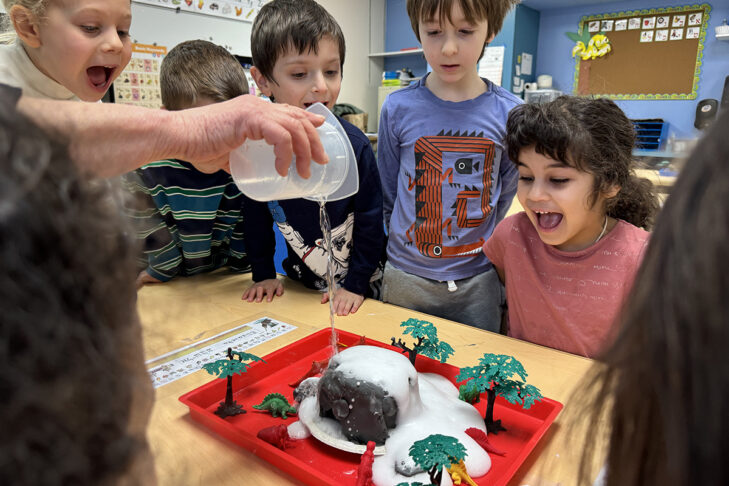It might be spring, but parents of pre-K students are already thinking about the fall. Families are registering their children for the next school year and in some cases, submitting applications for private schools. As children approach their 5-year-old milestone birthday, many parents wonder, “Is my child ready for kindergarten?”
To address this nuanced question, Epstein Hillel School has developed program materials for parents that explore three concepts: the most important considerations for kindergarten readiness; how a family can prepare their child for kindergarten; and what are the indicators that a child may not be quite ready for kindergarten.
The EHS team shares that the most important markers for kindergarten readiness are not related to reading, writing, or arithmetic. Rather, the key factors are social skills, executive functioning, and emotional development. Natalie Maryansky, LICSW, director of student services and school counselor at EHS, said, “The link between social-emotional development and academic progress is clearer now than ever. Ideally, children will enter kindergarten having developed basic skills in social and emotional regulation.” She goes on to say that parents should observe whether their child typically gets along well with others, respects their teachers and their classroom environment, and demonstrates empathy and kindness. Additionally, children should be able to “engage in reciprocal social conversation and cooperative play, exhibit flexibility when things do not go as planned, and are open to resolving conflict with peers, with adult guidance.”
Some basic expectations in executive functioning upon entering kindergarten are that your child can follow multi-step directions; independently complete the morning routine of entering school and the classroom; persist on a task for 10-15 minutes; and sustain their attention for 15-20 minutes at a time.
Maryansky reassures parents that all of these social and executive functioning capabilities can be emerging skills and don’t need to be perfected prior to kindergarten. “Kindergarten is a year of growth. At Epstein Hillel School, we continue to work on these skills in the early grades through our Social Thinking curriculum, which helps children learn how their behavior impacts others.”
That said, there are ways in which parents can help their children develop and practice these skills at home through routines, responsibilities, and play. For example, parents can encourage early friendships by promoting opportunities for play outside of the home. Also, parents should have frequent informal conversations with their children, using meal times and car rides to engage children in conversation.
EHS kindergarten teacher Sharon Miller adds that “children should learn how to share ‘air time,’ not just toys. They should practice listening to a response instead of just asking questions.”
As far as executive functioning, Maryansky suggests that parents work with their children using four techniques: 1. Practice 2-step directions using “first, then” words and ask your child to repeat the directions back to you. 2. Implement visual schedules for your child’s simple daily routines. The schedules should be simple and at eye level. 3. Prepare your child for transitions by previewing the plans for transitions. Set a timer in front of your child so they feel part of the process. 4. Have your child assist you with jobs around the house, such as laundry, to practice responsibility.
Similarly, the EHS team recommends that parents encourage and practice age-appropriate independence, such as getting dressed in the morning, eating with utensils, putting toys away, opening food packaging on their own, and buckling and unbuckling their car seat to get in and out of the car safely in the carpool line.
For parents who are concerned about academic preparedness, Miller assures them, “The academics are what we do here. Truly, children don’t need to be reading, writing, or counting by kindergarten.” However, she continues, some of these early academic skills can start to be introduced at home through play. “For example, making collections, sorting, and comparing things are actually math concepts and are also fun activities for preschool-aged children. Board games can also introduce many academic and social skills. Consider when a child learns to play a game and is not always the winner. The emotional regulation needed to react appropriately takes time, and that’s something parents can practice with their children through repetition.”
There are, of course, cases where children might not be ready for kindergarten. According to Maryansky, if a child consistently has trouble separating from a caregiver, has difficulty being part of a group for even short periods of time, or doesn’t demonstrate social reciprocity skills, those could be indicators that the child needs a little more time before kindergarten. “However, every child is unique, and we don’t make those decisions in a vacuum. EHS always takes a comprehensive approach to understanding the student.”
If it turns out that your child is not yet ready for kindergarten, Miller recommends viewing that extra time as a gift. “Childhood is a journey, not a race,” she says. “Allow your kids to have more time to explore and play, to be outside, to learn how to play games.” Even simply taking your child to museums or to the playground can help a child’s development. “Children are much better off coming in strong and ready instead of trying to keep up with a group that feels like it’s racing ahead.”
This post has been contributed by a third party. The opinions, facts and any media content are presented solely by the author, and JewishBoston assumes no responsibility for them. Want to add your voice to the conversation? Publish your own post here. MORE


